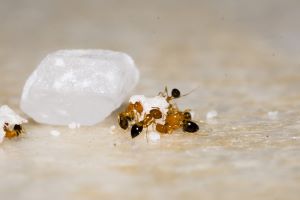No matter how clean and tidy your house is, ants can find their way in.
Dealing with invading ants can be a tricky task. You want to use remedies that are quick and effective but are also not injurious to you or your family’s health.
For other ideas on how to get rid of ants, check out our recent guide.
The internet is today’s go-to place to find old wives’ tales for every household solution under the sun; you may have already stories of common household items like baking soda and cornmeal being used to kill ants.
Well, does baking soda kill ants?
The bottom-line is maybe. There is no scientific reasoning to backup the theory that baking soda kills ants. However, a lot of people have tried this method and some have seen great success!
I recently conducted a small experiment and sprinkled some dry baking soda, as well as a mixture of baking soda and water directly on a line of ants. Neither method worked. I also tried several variations as discussed later in this article.
It took me several days to perform each variation and confirm the results of my baking soda and ant experiments. After much tinkering, I did see some success with particular variations.
Table of Contents
What Is Baking Soda?
Baking soda is a base mineral and scientifically is known as sodium hydrogen carbonate. Baking soda is mistakenly assumed to be the same as baking powder but in actuality is a different entity.
Baking powder, which is often mistaken for baking soda, is a mixture of baking soda, an acid mineral, and a small amount of cornstarch.
Baking soda is much more than just a bakery ingredient. It is also used as a natural cleaning agent; baking soda clears out the hardest stains and filth, de-clogs sinks, and refreshes your home’s scent. As part of a beauty treatment, baking soda can also be used to repair skin and hair texture.
What’s The Deal With Ants?
Ants found in our houses are different than outdoor ants. They come in different species, shapes, and sizes.
There are over 10,000 different species of ants, and most of them have their own distinct habits, behaviors, and characteristics. For their small size, these little creatures have a nearly unlimited number of variations.
In a publication from 1999 it’s estimated that 1,275 species live in Australia. It looks like ants love it in Australia, as 15% of all discovered species can be found on the continent.

Look Familiar?
A recent United States national survey found that ants are the most prevalent in-home pest with 49 percent of homes having ants.
Ants Are Old
Ants are one of the world’s most successful and diverse insect families, with more than 12,000 species. They are eusocial and known for their highly organized colonies and nests, which sometimes consist of millions of individuals.
Individuals are divided into sub-fertile, and more commonly sterile, females (“workers”), fertile males (“drones”), and fertile females (“queens”)”.
In 2006, Scientists from Harvard and Florida State University collaborated to conduct a massive genetic analysis on ants from 19 out of 20 known subfamilies. Their findings suggested that ants first arose in the mid-Cretaceous period — about 110—130 million years ago.
And yes, that means ants have already survived a mass extinction event. The Cretaceous-Paleogene extinction event (still commonly referred to as the Cretaceous-Tertiary — or “K-T” — extinction event) is thought to have occurred approximately 65 million years ago following an absolutely massive impact event.
Widely regarded as the downfall of the dinosaurs (and incidentally, the rise of mammals), the years following the KT-extinction event are actually believed to have been a time of incredibly rapid speciation and worldwide expansion for ants, marking what researchers Bert Hölldobler and Edward O. Wilson — authors of the Pulitzer-prize winning book The Ants — call “a rise to ecological dominance.”
According to another research study, scientists estimated the population of ants to be approximately 10,000,000,000,000,000 individual ants alive on Earth at any given time.
Ants have senses that help them to find their food. They use chemical trails, touch and other methods as a way to communicate with the rest of their colony mates; as a result you see ant trails and hundreds of ants walking in a line to pick up food supplies and take them back to their nests.
So how does baking soda come into play?
Research suggests that baking soda does act as a natural pesticide so why not to take chances by making some mixture variations.
Baking Soda & Ants
There are many non-toxic remedies available in the market for killing ants. One of the most discussed ingredients is baking soda.
However, baking soda alone cannot kill ants. You need more than just baking soda to destroy a colony of ants.
You might be wondering, why should I use baking soda if there are ant baits available to buy? We understand, but for the person that is looking for a natural remedy, or someone that likes to do things themselves, baking soda can be a great solution.
If you’re not that type of person, you can read our best ant bait article, where we review available commercial ant baits.
1. Baking Soda And Sugar Paste
Ants are actually relatively adept at staying away from baking soda. However, coating the baking soda with sugar creates some deception and attracts ants towards the mixture, resulting in it then being shared with the colony.
All you need to do is mix equal parts of both baking soda and confectioners sugar and sprinkle the bait where you see the ants coming and going.
TIP: Use only confectioners sugar. Ants can separate out regular sugar.
Killing individual ants with this technique is easy, but the whole colony is another story. During our personal baking soda ant experiment, the kitchen ants again returned the following day after using a baking soda and paste mixture.
2. Baking Soda with Boric Acid
Boric acid isn’t as common a household product as sugar. However, it isn’t just a household item, but is also an effective insecticide used in many chemical pest products.
Boric acid is highly toxic in nature; therefore, it should be used with care and shouldn’t be handled with bare hands.
Also boric acid should be kept away from children and pets.
So where does boric acid fit in when it comes to killing ants?
Add boric acid powder in the sugar and baking soda mixture for an even more potent DYI ant killing method.
3. Baking Soda and Powder Vitamin C
A new homemade ant eliminating agent is Vitamin C. Take a vitamin C pill and crush it into a baking soda and sugar mixture.
Add some water to make a paste and apply the bait in the corners, near drains and other places where you suspect ants can build their colonies. We’ve found that this mixture tends to create the same effect as the boric acid powder mixture.
4. Baking Soda and Cooking Oil
Baking soda can also be combined with cooking oil. You just have to take one teaspoon of baking soda and mix with 1/3 of any available cooking oil.
Add 2 spoons of the baking soda and cooking oil mixture to one cup of warm water and pour it in a spray bottle. This mixture keeps small ants and other insects away from your kitchen and makes for a great homemade spot treatment.
How Does Baking Soda Baits Kill Ants?
Whenever ants consume baking soda mixed with other elements a chemical reaction takes place. What happens to an ant when it eats baking soda is the same effect you get when vinegar and baking soda is mixed together.
Essentially baking soda reacts with the acid in the ants’ digestive system generating carbon dioxide as a derivative gas which alters the ants’ pH levels. The change in pH level, while uncomfortable for us, is fatal to ants.
The downside? Baking soda alone cannot be transmitted to the rest of the colony. While it may kill those ants that came into contact with it, baking soda will not eradicate all of the ants in your house.
Ants Outside The House
We also need to categorize the ants when it comes to killing the ants. Baking soda if used to kill the ants outside (on ant hills/ nests) the house might not be a very effective idea.
However sprinkling baking soda might help to deter ants and keep them away from entering into your house.
Ants In The House
Baking soda combined with sugar and other ingredients is an effective DIY, natural remedy for ants living inside living rooms and the kitchen.
Place the bait in corners and the places where most ants are seen overnight to let the bait be consumed.
Check back the next day and see how many ants you’ve killed.
Closing Thoughts
Ants are one of the most common pest problems. The lone ant may not be much of a threat, but if a large nest has been made in your home, the consequential infestation can be slightly more problematic.
So if you want to kill ants or deter them from invading your house, you have the option between commercial ant baits and baking soda as a natural, DIY alternative.
Baking soda is a handy household ingredient that is an over the counter solution for deterring ants for a short period of time.
Baking soda isn’t a harmful chemical. For a quick fix to ward off unwelcome intruders, you can try the baking soda and sugar technique. But if you are looking for a long term solution and need more killing power, try adding boric powder to your baking soda ant baits.
While unconventional, we think you’ll be pleasantly surprised by baking soda’s effectiveness against ants. You’ll also be happy about its lower cost compared to other ant baits and sprays.




